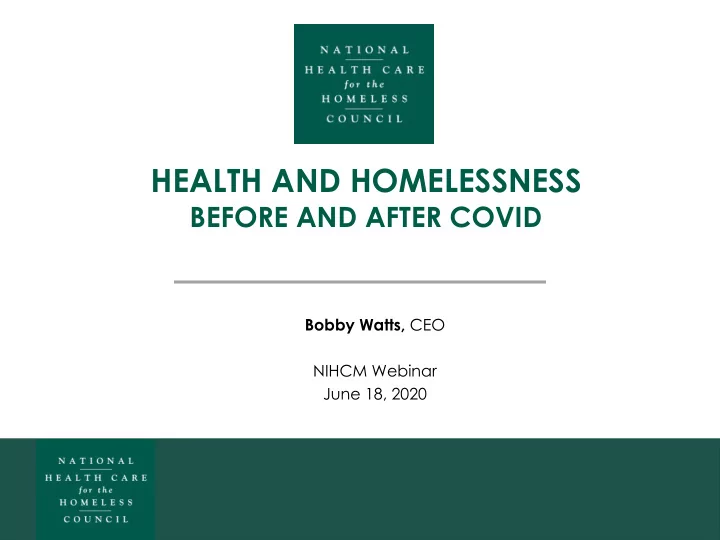

HEALTH AND HOMELESSNESS BEFORE AND AFTER COVID Bobby Watts, CEO NIHCM Webinar June 18, 2020
OUTLINE Who we are & what we do 1. (& why it’s relevant to you) Overview of Homelessness 2. and Health care Innovation Focus: 3. Medical Respite Care (aka “recuperative care”) Response to and Lessons 4. from COVID Pandemic
NHCHC MISSION Grounded in human rights and social justice, the NHCHC mission is to build a high-quality, equitable health care system through training, research and advocacy in the movement to end homelessness.
www.nhchc.org
300 HCH PROGRAMS NATIONALLY HRSA Health Center § program – FQHCs serving a “special populations” group 330 HCH programs served § ~1 million patients in 2018 (250K in California) Primary care, mental health, § addiction treatment, dental, case management, outreach, health education, preventive care, etc. Fact Sheet: The Health Care for the Homeless Program
HCH PROGRAMS AND INTEGRATED HEALTH § The HCH model includes Outreach, Mental Health and Substance Use Disorder services § From the beginning: → HCH programs have addressed social determinants of health as part of treating people holistically → HCH programs have used multi-disciplinary teams to treat the complexity of their patients’ needs → HCH programs have met patients ‘where they are’ in non- judgmental, accessible ways → HCH programs have employed trauma-informed and harm- reduction practices § HCH programs serve 4% of FQHC patients, but deliver 38% of MAT services
HOMELESSNESS & HEALTH § Poor health causes homelessness § Homelessness causes new health problems & exacerbates existing ones § The experience of homelessness makes it harder to engage in care and receive appropriate services
Health Needs & Barriers to Health Utilization Care Access Chronic, acute & ID, mailing behavioral health address/phone, conditions transportation, paperwork, income Use of EDs, hospitals, Ability to engage in SNFs, inpatient MH, follow-up care, detox, jails, EMT, medication mgmt, police, etc. insurance requirements Social services needs Rigid treatment such as housing, models, stigma, food, transportation, distrust, admin hurdles case mgmt
MEDICAL RESPITE: DEFINITION Acute & post-acute medical care for § Diversity of people who are homeless who are too ill Programs or frail to recover from sickness or injury on the street, but not sick enough to warrant hospital-level care Ø Size Short-term residential care that allows § Ø Facility people who are homeless to recuperate in a safe environment while accessing Ø Length of stay medical care and support services NOT: skilled nursing facility, nursing home, Ø Staffing & § services assisted living, BH step-down, or supportive housing Ø Admission criteria
RESULTS OF MEDICAL RESPITE BOSTON - Patients who had CHICAGO - Patients who access to medical respite had access to medical care had a 50% reduction respite care required 5 fewer in the odds of readmission hospital days during 12- at 90 days post-discharge (2) months of follow-up compared to those released to usual care (1) HARTFORD & FT. LAUDERDALE - Patients who SEATTLE - Patients had access to medical completing IV therapy in respite care projected to medical respite care reduce ED visits by 45% (4) saved hospital $24,000 per patient (3) 1. Buchanan, D., Doblin, B., Sai, T., & Garcia, P. (2006). The effects of respite care for homeless patients: A cohort study. American Journal of Public Health, 96(7), 1278–1281. 2. Kertesz, S. G., Posner, M. A., O’Connell, J. J., Swain, S., Mullins, A. N., Shwartz, M., & Ash, A. S. (2009). Post-hospital medical respite care and hospital readmission of homeless persons. Journal of Prevention & Intervention in the Community, 37 (2), 129–142. 3. Alexander, K, et al. (2019). The benefits of medical respite: patient perspectives and an analysis of cost savings. University of Washington, School of Public Health. 4. Shetler, D. and Shepard, DS. (2018. Medical respite for people experiencing homelessness: financial impacts with alternative levels of Medicaid coverage. Journal of Health Care for the Poor and Underserved 29(2), 801-813 .
HOMELESSNESS AND COVID § People Experiencing Homelessness (PEH) are at increased risk from COVID § Both CDC and HUD issued guidances for protecting PEH and reducing transmissions in congregate settings and for unsheltered PEH § Use of Alternate Care Sites (ACS) for Isolation and Quarantine for PEH § More humane approach to encampments § Challenge of Testing § Pandemic brought into sharp relief inequities and inadequacies of our health and social systems
COVID AND MEDICAL RESPITE RESOURCES A WEALTH of Material on COVID at www.nhchc.org/coronavirus § Anti-racism resources at www.nhchc.org/anti-racism § Medical Respite Care Program Directory § Respite Care Providers Network § Policy brief: Medical Respite Care: Financing Approaches § Policy brief: Medical Respite Care Programs & the IHI Triple Aim § Framework Policy brief: Managed Care and Homeless Populations: Linking the § HCH Community and HCH Partners Technical Assistance requests §
Recommend
More recommend